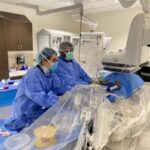The recent shootings in a Pennsylvania Emergency Department that killed one police officer, critically wounded another, and left an ED tech seriously injured has resulted in ongoing discussion regarding the issue of police officers and armed security officers securing their weapons in patient care areas. For years this has been a hotly debated topic among security professionals and law enforcement professionals alike. In the Pennsylvania case, after arresting a suspect for drunken driving and for assaulting his girlfriend in a car, police took the offender to the hospital emergency department for a routine blood alcohol test. At the hospital, police took his handcuffs off so blood tests could be drawn and a urine sample obtained. That was when the suspect grabbed an officers gun and open fire, hitting several people and putting the hospital into a lockdown.
Security administrators and hospital risk managers often express their desire to have police officers secure their weapons prior to entering the patient care area of the Emergency Department, much the same as is done when the police officer enters a Mental Health Unit. Police officers seldom resist securing their weapons when entering a Mental Health Unit, but many are often resistant and some absolutely refuse to comply with attempts to get them to secure their weapons in the Emergency Department. As one Police Administrator stated, “Typically, security is much tighter in a Mental Health Unit, where the unit is locked down and public access is restricted. The officer feels safer in this environment. In an Emergency Department, many of which have open access right off of the streets, the police officer has no way of knowing who may walk through the door at any point in time.” This is a very valid argument from a police officers perspective. At the same time, as more and more Emergency Departments are being locked down around the clock, public access to the patient treatment areas is as well restricted as it is in a Mental Health Unit. As a result, the risk to police officers and armed security officers to unexpected intrusion is significantly reduced. Another law enforcement administrator stated that, “The weapon gives the police officer a sense of security. Without it, he feels naked and vulnerable. These same officers will not cooperate with any business or facility that imposes weapons restrictions, which is often ridiculous.” Obviously, there are police officers who take the weapons issue to an extreme, not just in the hospital setting, but in any setting. The issue of checking weapons is one that hospital security administrators, risk managers, hospital administrators, and law enforcement professionals will continue to wrestle with. In a locked down Emergency Department, checking of weapons should be given serious consideration. The fewer weapons that come into the Emergency Department, the lesser the chance of an incident. At the same time, when police officers or armed security officers check their weapons, they may be surrendering the only defense they have to protect the Emergency Department from the presence of weapons brought in by patients and/or visitors, a common concern in any Emergency Department. In the presence of a well managed, well developed hospital security program, checking of weapons is a practice worthy of consideration. However, in an open environment, despite the risks that we recognize by studying cases like the Pennsylvania incident, weapons in the Emergency Department may continue to be a necessary evil for the protection of patients, visitors, and staff.Recent Posts
-

-

-

-

-
 Youth Talent Explosion Dazzles Audience in Riviera BeachApr 19, 2024 | SF STAT!
Youth Talent Explosion Dazzles Audience in Riviera BeachApr 19, 2024 | SF STAT!





















